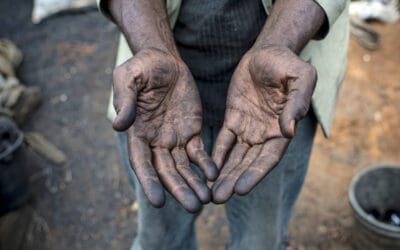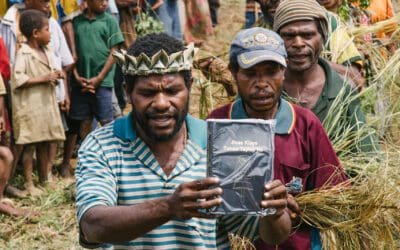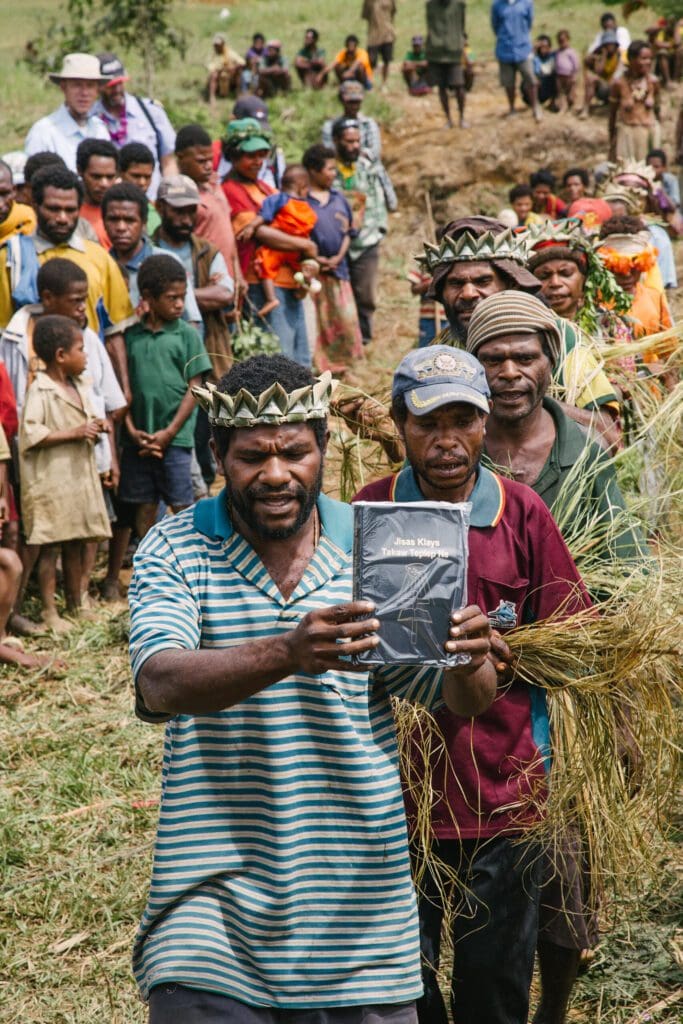“This … this is a good feeling.” A wide smile beamed from Victor Mikebanyi’s face. It was 2021, and he had just received news of donated office space for his small team of Bible translators. A Bible in his own language had been Victor’s prayer for 39 years. Now this prayer was beginning to be answered. Pioneer Bible Translators, Southeast Christian Church, and the team Victor had formed would partner to launch Pioneer Bible Translators’ 100th project: the Bible in the Kinyamulenge language.
The Planting of a Seed
It was 1982 in the eastern Democratic Republic of the Congo. Young Victor Mikebanyi rose early in the morning. He had travel plans that day. A neighboring people group was hosting a celebration, and Victor planned to attend.
This was no ordinary celebration. The people were about to receive the Gospel of Luke in their own language. Victor had never been to an event quite like this, and he was curious to see what it was all about.
When Victor arrived at the village, he sensed eager anticipation surrounding him. Joy beamed from people’s faces as they listened to God’s Word in their own language for the first time. As he watched, his own soul filled with longing. “We Kinyamulenge speakers do not have the Bible in our mother tongue!”
Seeing his neighbors’ joy planted a seed in Victor’s heart. He began to dream of having the Bible in his own language.
Many in Victor’s community were believers. Victor himself had grown up in a Christian household and would soon attend seminary. Yet he and his people continued to live without the Bible in their own language. No one had translated it for them. In fact, Kinyamulenge had never even been written; it was only a spoken language. But Victor had seen his neighbors’ joy. He now knew that translation was possible, and a seed was planted in his heart. Victor dreamed of holding a copy of the Bible in Kinyamulenge.
The Magnitude of the Need
When Victor returned home from the dedication, he told others about his desire for a Kinyamulenge Bible. He explained to his pastors and elders, “I want to have a Bible in the language of our hearts, the language we understand well.” They responded with contempt. “You are young. Why worry about a new translation?” they asked. Victor waited.
The Democratic Republic of the Congo, Victor’s home country, shares its western border with Rwanda. The people of Rwanda speak a cousin language of Kinyamulenge. The two languages are so similar that they even share several words. Because of this similarity, Kinyamulenge speakers often use the Rwandan Bible.
Most Kinyamulenge pastors were content using the Rwandan Bible. They did not understand Victor’s desire for a Kinyamulenge translation. “The Rwandan Bible,” they said, “is good enough.” Despite the opposition, Victor remained hopeful.
Over the next several years, Victor attended seminary. In class, he pored over the Bible. He studied the Rwandan, French, and Swahili translations. He compared and contrasted the various versions. He strove to understand God’s Word.
As he studied, Victor began noticing differences in his interpretation of the translations. In some passages, different versions even appeared to have different messages. “I read in the Swahili, I understood it one way. I read in the [Rwandan], it’s a different way … the same verse, but opposing messages. It was really confusing.” Victor’s concern grew. Why did the translations seem to teach such different lessons?
As his longing for a Kinyamulenge Bible grew, Victor began praying for a translation.
The differences Victor noticed between the translations, and the resulting confusion, only added to his longing for a Kinyamulenge Bible. He started praying for a translation. And as he prayed, he began developing a written form of Kinyamulenge.
Before long, Victor was called to foreign missions. He moved with his family to Nairobi, Kenya. There they served as missionaries, and life kept him busy. But Victor continued to contemplate translation.
Seventeen years after his visit to the neighboring Gospel dedication, Victor’s concern climaxed.
It was 1999, and Victor was conversing with his neighbor, a woman from Rwanda. They were discussing their respective languages. They noted shared words and began comparing definitions. Victor thought that he understood the Rwandan language well. After all, he had grown up using the Rwandan Bible and had studied it throughout seminary. But as he chatted with his neighbor, he made a startling discovery.
Umurava. This is a word shared by both Rwandan and Kinyamulenge. It is one word, spelled the same in both languages, but with different definitions.
In Kinyamulenge, umurava means “careless” or “unfaithful.” But as his neighbor explained the Rwandan meaning, shock ran through Victor’s body. In Rwandan, umurava does not mean “careless.” It means “courageous,” “faithful,” “and reliable.”
Faithful, not careless.
Victor immediately recalled Psalm 119:90, a very familiar verse. He and other Kinyamulenge pastors had often read it in their Rwandan Bibles. As he grasped the correct definition of umurava, Victor’s understanding of God changed completely. For years, he and other believers had read Psalm 119:90 and understood it to say, “Your carelessness continues through all generations.” Victor had grown up believing that God was careless and unfaithful. Learning the meaning of umurava in the Rwandan Bible gave him a very different understanding of God. “Your faithfulness continues through all generations.” Finally, Victor understood the truth. God is courageous, reliable, and faithful.
The Bible they read in a different language led them to understand that God is careless and unfaithful.
“I [feel] choked [realizing] that there [are] Bible verses that I understood the opposite of the Biblical message,” Victor told a friend. How could he continue using a translation he did not understand accurately? A translation that led him to misunderstood God? Victor would no longer use the Rwandan translation. One small misunderstanding had completely skewed his perspective of God.
Victor soon realized this was not the only example of errors in understanding that came from reading Scripture in another language. Several years later, his friend Philemon began searching the Scriptures for other misunderstandings like umurava. In the Gospel of Matthew alone, Philemon found 112 commonly misinterpreted words.
“Yes,” Philemon told Victor, “there are many Rwandan words which we do not understand the same in our language.” They knew beyond doubt that they needed a Kinyamulenge Bible.
The Work of a Translation
Over the years, Victor had sought others to help jumpstart a translation project. Few showed interest. Finally, in Philemon, Victor met a brother willing to join him. Neither man hadprofessional training in linguistics or Bible translation. They were pastors, trained in studying and teaching God’s Word. Though ill-equipped by common standards, Victor and Philemon began moving forward. They devoted time and resources to startingthe translation project. Without experience or guidance, progress dragged, but they continued to work and to pray.
In the years that followed, Victor and Philemon moved from eastern Africa to the United States. Victor’s ministry called him to Southeast Christian Church in Louisville, Kentucky. Here, his time and energy turned towards local development. Philemon and his family established themselves in Georgia. For several years, Victor and Philemon had to step away from translation efforts. But still, the dream of a Kinyamulenge Bible lived within them.
In 2016, Victor was asked to speak at a conference in Louisville. Kinyamulenge-speaking pastors from around the nation attended the conference. Victor shared his translation dream again, describing what he had learned over the years. He spoke about the misinterpretation of umurava and the need for a Bible in their own language. This time, Victor’s words touched the hearts of his hearers.
For years, many had failed to catch the vision of a translation. Few had understood the magnitude of the need. Beyond their own families, Victor and Philemon had worked with only a handful of others.
But this conference was different. This time the pastors understood. They caught the passion of Victor’s heart. With overwhelming support they declared, “Now it is time. We should have Jesus speaking Kinyamulenge.”
After the conference, Victor immediately went to work. Many of the conference pastors formed a committee and soon began making plans for a translation project. Victor met with a translation specialist to learn what steps he should take. “You need three things,” the specialist told Victor. “First, you need native speakers of Kinyamulenge. Second, you need technical support — someone who understands translation. And finally, you need funding.”
Victor took stock of his resources. First, they needed native speakers. The U.S. hosts a large number of Kinyamulenge speakers. Louisville alone, Victor estimated, had 3,000. Many had moved to the United States due to political and social unrest in their home county. Victor reached out to this tight-knit community. With few exceptions, the entire Kinyamulenge-speaking community supported the translation project. God’s hand of blessing was evident. With sturdy partnerships forming, Victor felt reinvigorated.
Second, they needed technical support. For a short time while they were still in Africa, an American missionary had assisted Victor and Philemon, but that was years ago. Victor had previously had contact with Pioneer Bible Translators, but he had not spoken to them for some time. He decided to ask for their help anyway. After much prayer and consideration, they said yes. One of their missionaries, Tim MacSaveny, stepped up to serve as their translation coordinator. With this partnership, Kinyamulenge became Pioneer Bible Translators’ 100th translation project!
Finally, Victor needed funding. In the past, few donors had shown interest in funding the translation, but Victor trusted the Lord to provide. Through Pioneer Bible Translators and Southeast Christian Church, God began to provide funds. The church also offered office space to the fledgling team and became the home base for the project.
Great joy and expectation danced in Victor’s heart. The committee of pastors chose three Kinyamulenge speakers to serve on the translation team, each uniquely qualified to do the work. Victor’s long-time friend Philemon was one of the three.
Finally, Victor and Philemon knew the project was growing beyond themselves. It was taking another step. In January of 2021, translation work began.
The Abundance of Joy
“In 1986, I started wishing that we had the Bible in a language I understood well,” Victor said. Today, the translation team is working hard. They long to give God’s Word to their people in their heart language. Deep joy radiates from both Victor and Philemon’s faces as they begin to see their dream taking form.
“Now we are going to have Emmanuel. Jesus with us. A Jesus who speaks Kinyamulenge. A Jesus … in our own language. We’ve had French Jesus, Swahili Jesus, English Jesus, Rwandese Jesus, but now we’ll have Kinyamulenge Jesus.” This joy, Victor says, is beyond words. It is inexpressible and full of glory.
Philemon agrees. “God is working miraculously in many ways.” A calm smile breaks across his face as he continues, “Because for us to start this project, we believe that God is doing great things.”
“Now we are going to have Emmanuel. Jesus with us. A Jesus who speaks Kinyamulenge. A Jesus … in our own language.”
And it is true, God is doing great things. He provided the speakers and the technical support, and He is supplying the funding. God blessed Victor’s efforts to create a written form of Kinyamulenge. The finalization of that process continued even as the translation work began. God is providing for the needs of the translation team even as they sacrifice comfort for the sake of the project. Team members moved to Louisville from their homes in other parts of the U.S. They gave up full-time jobs to rely on part-time ones and the support of others. Through it all, God is blessing the team with great encouragement and joy.
As word of their work spread to Kinyamulenge speakers in Louisville and around the world, people began contacting the team to request copies of the translation. One man asked for 1,000 copies! This kind of excitement, before even one book of the Bible had been translated, filled the team with urgency and purpose.
The Firstfruits of Prayer
In January 2024, Victor held for the first time the Gospel of Luke in his own Kinyamulenge language. The dream that God planted in his heart as a young man was coming to fruition. God kept Victor’s hope alive despite challenges and years of waiting. At last he is seeing the firstfruits of decades of praying and trusting God’s faithfulness. “And this,” he says, “… this is a good feeling!”










